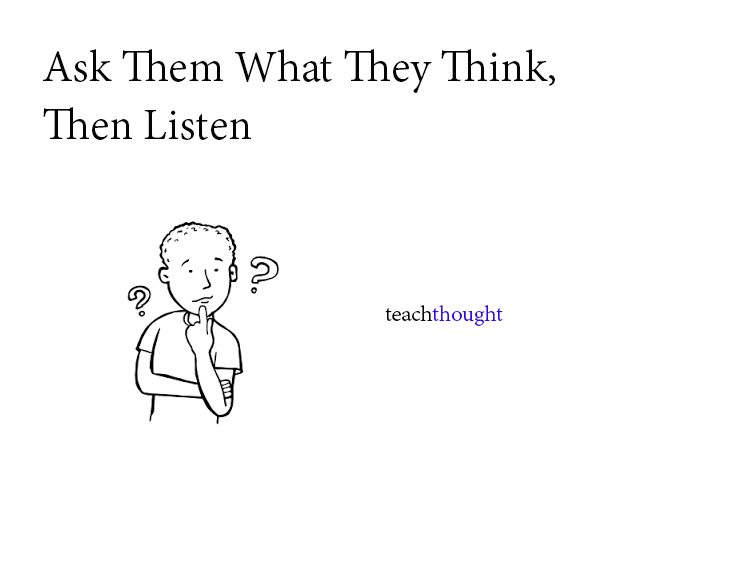
What Does A Socratic Discussion With A Student Sound Like?
by Terry Heick
What is a Socratic Discussion?
Here is a simple question that, asked with the right tone, can provide a lifeline to any student in any context.
What do you think?
It doesn’t ask for much–only what they think or believe. Well, it also asks that they articulate what they think, so that’s another step. But it doesn’t ask for accuracy–alignment between what they’re supposed to be thinking and what they actually think. There’s not much on the line if they trust you. It’s really a bit simple.
But if it’s not cognitively ambitious, it makes up for that with utility. The word think connotes interpretation and ownership. One knows what others also know; but thinking, that’s personal. Evaluative. Subjective.
I think that…
My thoughts are…
This is what I know…
This is where it starts to get useful. You’re not just asking what they know, but what they think they know; not what they believe, but what they think they believe. This requires them to get between you and the idea—to stand there and connect you to their thinking.
It also is accessible as long as they believe you’re only asking what they think and not what they know. After all, they’re often trained that what they think doesn’t matter–it’s about valid arguments and citing evidence and being credible, dagnabbit.
A relative of what do you think? is why do you think that?, and that one ramps up the complexity pretty quickly. I’ve heard arguments for more sensational variations, including the powerful, “What would you say if you did know?” I’ve tried that one, and they look at me like I’m crazy.
When I ask, “What do you think?”, I get a similar look but it’s something that I can actually insist that every student answer every time, no matter how little academic merit their response has. The idea? It gives me a kind of Socrative foothold to get started.
This is partly about engagement, partly about metacognition, and partly about student voice.
Teacher: Why was the Civil War fought?
8th Grade Male Student: I don’t know. Slavery?
Teacher: I asked you. What do you think?
Student: About what? The war?
Teacher: Sure.
Student: Uhhhhh….a lot of people died.
Teacher: That’s true. Why?
Student: Because they fought in a war.
Teacher: But there are a lot of wars, and not always as many people die as died in the Civil War. Why do you think that is? Any hunches?
Student: I’ve seen videos where they lined up in rows and took turns firing. Sounds kind of crazy to me.
Teacher: So you’re saying their tactics were primitive? Both sides?
Student: If ‘primitive’ means ‘dumb,’ then yes.
Teacher: I can see what you mean. So what does this tell you about both sides? Besides that you think they’ve could’ve been more strategic. Many of their field generals were known as geniuses, actually. Robert E. Lee. Ulysses S Grant. Universities study them and their decision-making carefully to learn from them.
Student: Why?
Teacher: Because things weren’t as simple as the reenactments you’ve seen make them look. There was a lot of geography and politics and technology and sociology at play. War is complex. And brutal.
Student:….
Teacher: So, back to the reason the war was fought to begin with? What do you think?
Student: I think there’s a lot I don’t know.
Teacher: Can you be specific? Give me an example of something you don’t know.
Student: Causes and effects of the war, for one.
Teacher: Now we’re getting somewhere. Something is missing! Not sure where we should start, though. What do you think?
Student: I think you should call on someone else.
Talking To Students: Ask Them What They Think, Then Let Them Answer; clipart via openclipart.org

